A Tent on a Deck, How Bad Could It Be?
How a Simple Deck Turned Into a Court Date
I have a friend of 30 years who has been there at every turn and tribulation of my real estate investing journey. He was there with me right after college when I "lost my mind," as some had said at that time, and bought my first property. Just as he cheered me on from the sidelines of my journey, I would be there to cheer him on when he began his. For him, the journey would begin with a small first step: a luxury campsite complete with a roomy canvas tent, a nice frame bed, all situated on an elevated deck. Recently the term "glamping" has come to describe this type of experience.
A few years back, Micah called me to share some exciting news: "We bought a cabin." While not intended to be an investment, the property's 26 acres provided ample opportunities to explore investment opportunities. Located in the heart of Schoharie County, nestled amidst the rolling hills of the Catskills' northern foothills, the property lies within the quiet town of Jefferson, New York. It's a place defined by its rural serenity and pastoral beauty, where farm fields and forest stretch out to meet the horizon. The landscape is a patchwork of working farms, dense woodlands, and open meadows, all set against a backdrop of distant, hazy mountains. So when it comes to places you can get away and get back to nature, the Catskills region is something special.
A few years ago, as we exited the pandemic, glamping really took off as a way to get out with the family while avoiding the potential risks of strangers. It was during these times that Micah discovered a new startup company called Tentrr, a company self-styled as the "Airbnb" of camping. For owners of campsites or potential campsites, Tentrr was a no-brainer. Unlike Airbnb, Tentrr offered a turnkey service where property owners could purchase a complete campsite, including all materials, supplies, and installation. Once completed, the campsite would be listed on their website for visitors to book and coordinate. For owners brand new to this business, Tentrr offered a very attractive solution.
After signing on the dotted line, a Tentrr representative came by to review the site and discuss the plans. It was simple: they would build a 12x12 deck, provide a tent, bed frame, mattress, fire pit, picnic table, washing station, and other assorted knickknacks. Better yet, the company provided guarantees and assurances in the contract that everything would be done in accordance with regulations. The rep that visited was a local contractor hired by Tentrr, and the conversation was great. Having a professional to talk through the process provided lots of comfort to Micah that he was in good hands. I remember getting a call from him sometime after to share his excitement. As for me, I was excited that my friend had such a great way to start his real estate journey. Little did we know that the effort required to reach the end of the process would be the exact opposite difficulty of the effort required to start the process.
A couple of months later, the deck was hammered into place, the canvas tent stood proud, and Micah's little slice of wilderness was officially bookable on Tentrr. He had visions of cheerful campers roasting marshmallows and a trickle of extra income sweetening the deal. It was a smooth sprint to the starting line, but that's precisely where the honeymoon ended. Within weeks, a cranky neighbor tattled to the town like it was high drama on a soap opera, and soon enough an inspector came traipsing through the property unannounced. Turns out, some folks just can't bear to see others chase their dreams. And as for minding their P's and Q's? Well, let's just say courtesy wasn't on the menu. Micah had done his homework and knew that installing this campsite tent and deck was perfectly legal.
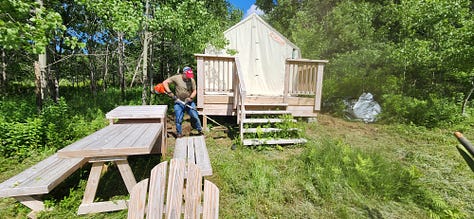
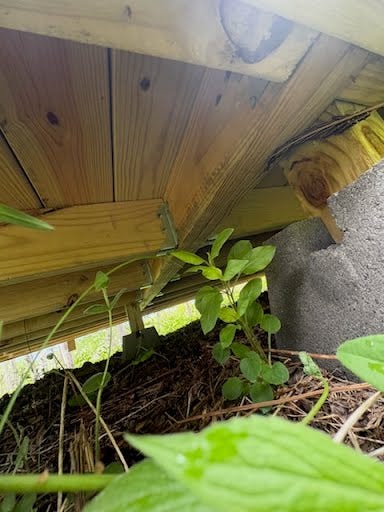
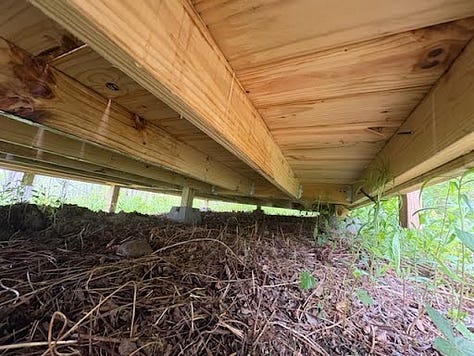
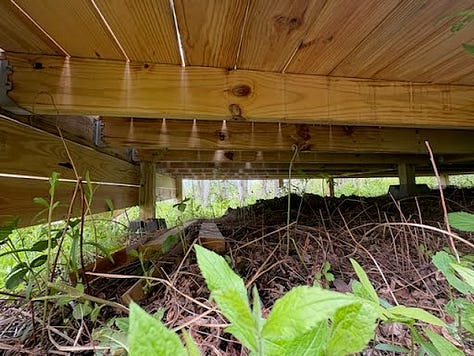
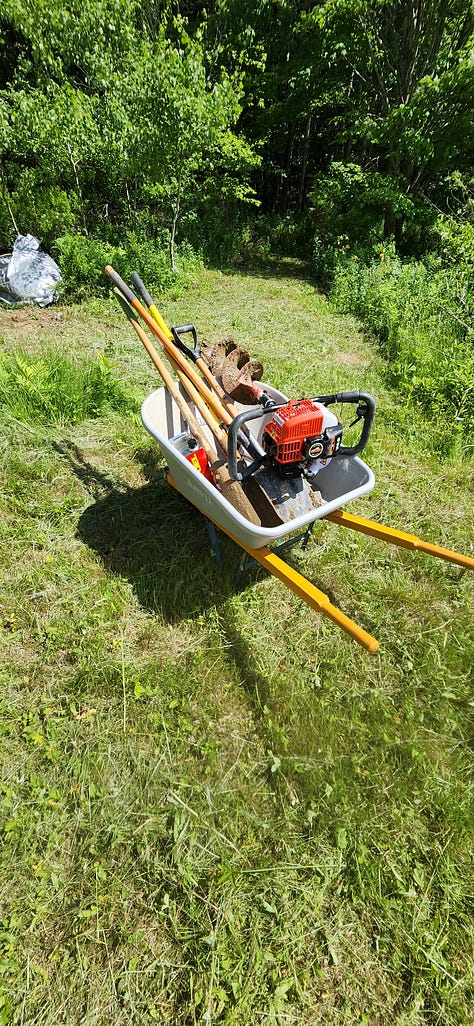

The inspector came by and walked to the site to inspect it. Micah had no idea that any part of this process was going on until he received a letter in the mail from the town issuing him a building code violation for the deck, with a summons for a court date. While everything was legal, the summons was a clear indication that something about that deck was not what Tentrr had promised. As for me, I knew nothing of the legal goings-on. Even worse, shortly after completing Micah's deck, Tentrr, like many overhyped startups, went belly up, leaving many unhappy customers in its wake. Micah was lucky; some folks had the misfortune of paying for the campsite in full only to find out they lost all their money and got nothing in return, a sum nearing $10,000.
It was late September of 2024 when Micah invited me up to his cabin, the same property as the campsite, to spend a couple nights camping and hanging out. As a Brooklynite, this was and still is one of my favorite getaways: hanging with good friends, working with your hands, and enjoying the peace and quiet of the countryside. The only catch on this trip was that Micah conveniently failed to mention his court date until I was unpacked and settled in at the cabin. That said, he knew me well enough to know that as a real estate nerd, I would probably enjoy the process. He was right.
I joined Micah at the court hearing where we heard the inspector give evidence that the deck that was installed by Tentrr was not up to code. After our court session with the judge, Micah and I had the chance to have a one-on-one with the inspector to discuss how we could resolve the issue. As with all municipal code violations, a fine is not far behind. In this case it was almost $500. So the first step was to pay the fine, and the second was to resolve the code violation. In Micah's case, the contractor had built the deck on an uneven surface that required the deck to stand on a few short 4x4 legs, the source of the violation.
Our in-person discussion with the inspector went well. He was nice and very reasonable; there were no gotchas. He took the time to explain to us the code, why the deck was in violation of the code, and how we could fix it. We also had the opportunity to discuss our approach to make sure that once the work was done, it would pass a final inspection. Both the judge and the inspector had empathy for the situation Tentrr had put Micah in. Unfortunately, violations come with fines, and fixing the violation or removing the deck were the only two options available to bring this situation to an end.
According to local code, a deck resting directly on the ground (meaning no legs required) does not need a foundation. Unfortunately, Micah's deck was built by the contractor in violation of the code. With the company out of business, there was no one to turn to. In order for this campsite to be fully legal, the deck would need to rest on six-inch diameter pilings, each 48 inches deep. In this part of the country, frost heaving is an issue, so the foundations of the deck need to be below the frost line. Otherwise, the ground would push the piling out of the ground in successive winters. To fix this deck, we would need to jack up the deck, install the pilings, and bring the deck back down to rest on the new foundation.
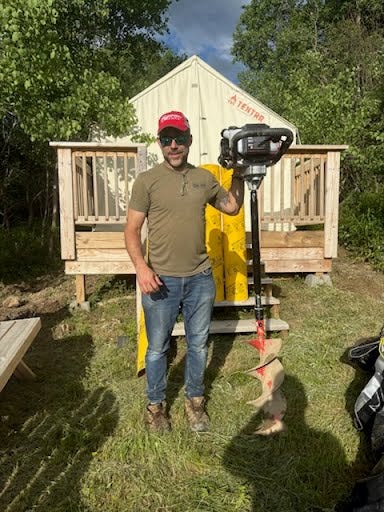
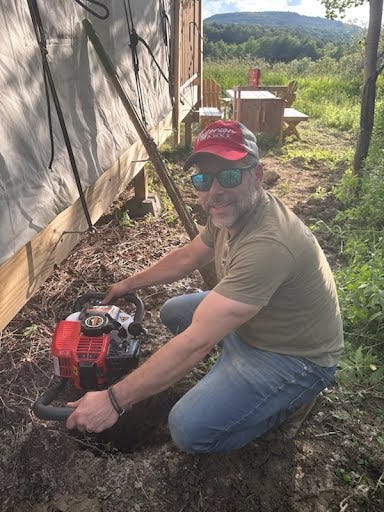
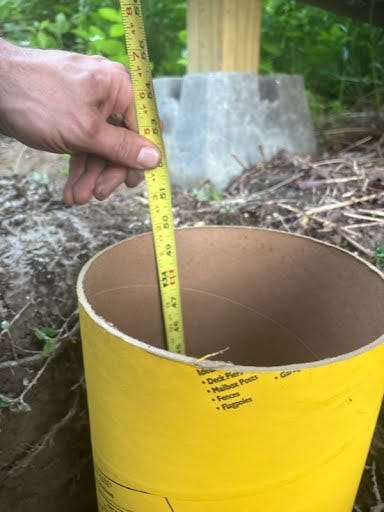
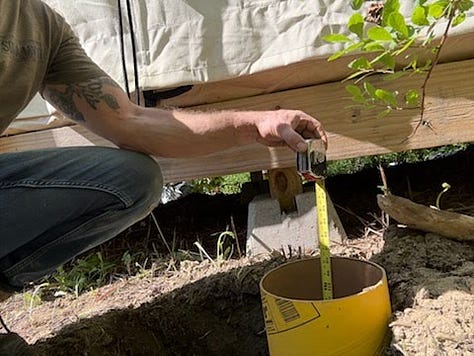
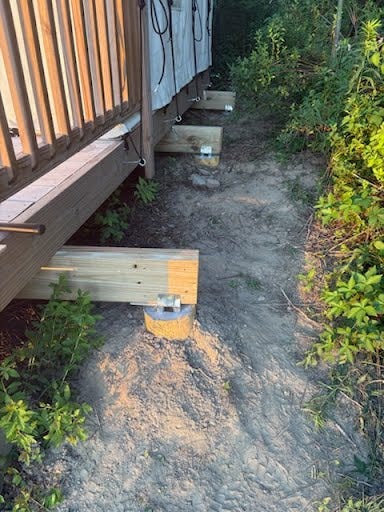
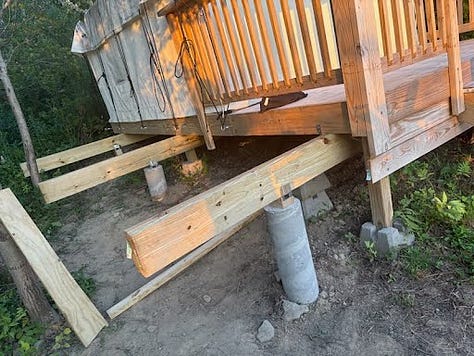
Like all good real estate investors, when the shit hit the fan, Micah rolled up his sleeves and got down to fixing the problem. It took a few days of work, about ten hardware store trips, a new gas-powered auger, a few 16-foot long 2x8 boards, a couple of car jacks, and about 20 bags of concrete, weighing 50 lbs. each. This was not a job for the faint of heart. Knowing my proclivity for building stuff, I am pretty sure Micah knew that if he called me to ask to be his laborer, I would oblige. And that is precisely how I found myself spending a couple of weekends getting bruises while wrangling a 48-inch auger and getting a few splinters jacking up the deck.
Micah's glamping adventure offers a masterclass in the fine print of real estate enthusiasm. At first glance, Tentrr's turnkey charm made launching a campsite feel like a breeze. But the experience proved that even well-intentioned shortcuts can stumble on local codes and community dynamics. So here are the three key lessons we can take away from this journey.
Lesson one: Trust but verify. Without a professional by your side who knows the code, it is critical to reach out to local officials to verify your building plans.
Lesson two: Don't assume that contractor credentials or company guarantees shield you from municipal red tape. They work for you on your property, which always makes it your responsibility.
Lesson three: It’s never easy. Operating real estate take grit and perseverance. The realities never sink-in until you are neck-deep in it.
Micah learned that real estate isn't just about putting something nice in the ground; it's about navigating everything above it too. In the end, the actual project cost was about 20% more than expected, compounded by the loss of potential guest fees prior to the violation being resolved. While these types of cost overruns blow up the project's financial model, they provided invaluable lessons. This project was very small in the grand scheme of real estate investing, but the lessons it taught were no less valuable.
Ready for more insights from the field? I've made the expensive mistakes so you don't have to. Subscribe to get weekly strategies, real numbers, and unfiltered lessons from 25+ years of actual deals. No theory, no fluff—just lessons learned and what actually works when your money is on the line.





👉 This read like a backwoods episode of Permit Court. What hit hardest was the reminder that “turnkey” doesn’t mean “trouble-free”—especially when the company folds and you’re left holding the legal bag. I appreciate how you didn’t just tell the story but walked us through the mud, concrete, and bruises. The “trust but verify” lesson is gold. So many real estate plays crumble not from bad ideas, but from skipped conversations with code officials. Thanks for showing the real cost behind a shortcut.